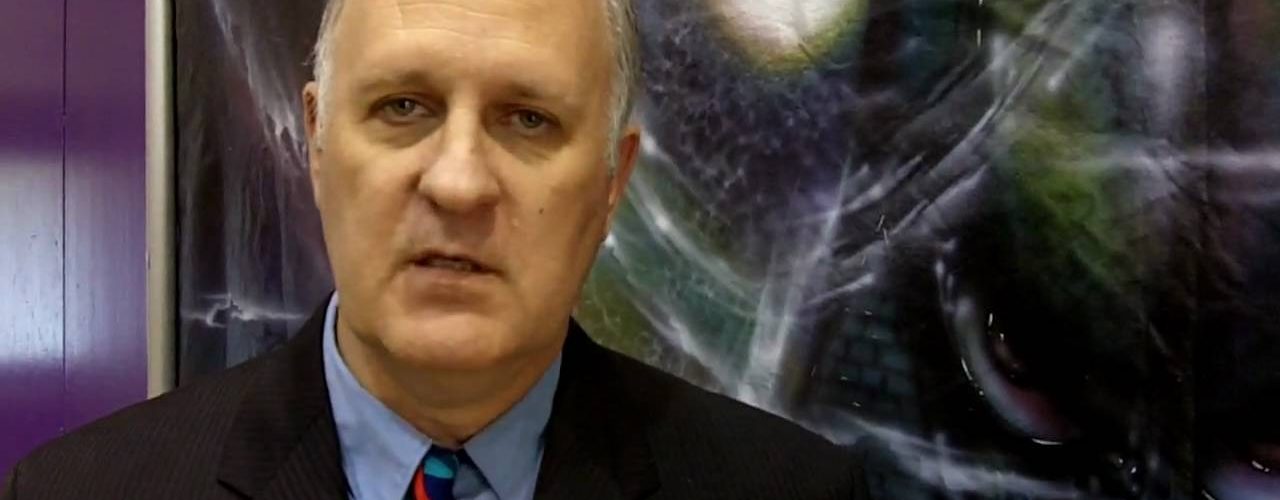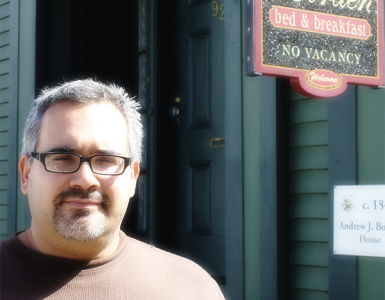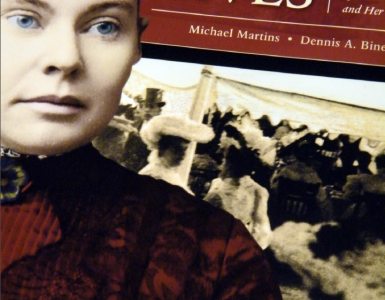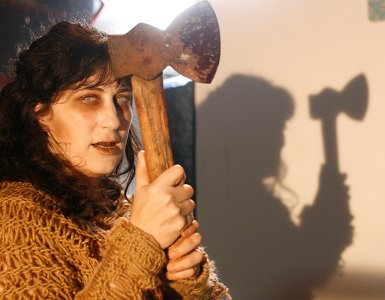by Stefani Koorey
First published in August/September, 2008, Volume 5, Issue 3, The Hatchet: Journal of Lizzie Borden Studies.
“My name is Leonard Pickel. I am editor of Haunted Attraction magazine, owner of Hauntcom Convention, and curator of the new museum on Lizzie Borden—a gift shop and museum that is going to be in Salem, Massachusetts—opening very soon, I hope.”
Q. Why Salem?
PICKEL: My background is actually designing and building October seasonal haunted houses for people around the country. We had done a haunted house in Salem and realized that it was great and did very well in October, but the rest of the year, people are there looking for history, they’re looking at architecture, looking at tall ships and of course they’re looking for witch stories that took place during that time period.
Back in 1992, I was living in Dallas, Texas, and there was an article in the paper by Bernie Sullivan about the one hundred year anniversary of the murders that had just taken place. At that time, the murder house was attached to a print shop and Maplecroft was in private hands, so there really wasn’t anything for the people to see other than the gravesite. I thought this would be a great opportunity to do something in Fall River with some kind of museum about Lizzie Borden, or maybe even a haunted house. So that’s been kind of blowing around in the back of my head since that time. A museum in Salem would be the perfect choice- people come there by the thousands looking for a kind of darker side of history. It’s also very female-based because people are looking at witches as a kind of female genre, so a Lizzie Borden museum was just a no-brainer, we thought. It was really kind of funny because for years we’ve been calling this “Project X” because we’ve been afraid that someone would steal the idea. We were shocked that no one had come up with the idea before us.
My pat answer is that ‘Well you guys just put a statue of Elizabeth Montgomery down the road, a witch statue down the road, and she played Lizzie in the first TV movie, so that’s our reason for being here.’
My favorite question was from a guy who came by just the other day and came in and asked, ‘What does Lizzie have to do with Salem? Shouldn’t it be in New Bedford?’ Why would it be in New Bedford? He said, “That’s where the murders took place.” Which proved my point exactly. The reason it needs to be in Salem is so that this guy can learn that it didn’t happen in New Bedford, it happened in Fall River. So he answered his own question.
Q. Do you think it’s going to increase information…people interested in the case and perhaps bring people down to Fall River?
PICKEL: Oh, absolutely. We’re going to make sure that everyone who come to the museum knows exactly where the murders happened; not in Salem, but an hour and a half south of there, and the murder house is now a Bed and Breakfast. That gives people the opportunity to tour the house, as well as perhaps spend the night. Also, the Fall River Historical Society has a nice display of artifacts. I think we are going to be able to pull a lot of people, that didn’t even realize that the Lizzie Borden murders happened in Massachusetts, and send them down to Fall River for more information and find what really happened. We’re a museum that could be almost a traveling exhibit that could go anywhere, and the reason we chose Salem was because of the massive tourism that’s already there. For many years we’ve been looking for the perfect location, which is very important in Salem, and the funding. The two together kind of fell together really very quickly at the end of last year, and we were able to get started.
Q. Are you finding that people are stopping by and asking questions and wondering what’s going on with your business there in Salem?
PICKEL: We get two reactions. We get reactions from the other merchants in the area that they’re excited about another museum that’s not witch-related, because there’s so many things there that just regurgitate the same old facts over and over again. It would give visitors something new and different and fresh, and give people a break from the witchcraft thing. It is Massachusetts’ history so it does fit nicely within the state.
Q. What are your plans for the inside- I mean do you have ideas about how it is going to be laid out and what you are going to include?
PICKEL: We do. The first section is going to be Fall River in 1892, to give people a feel for what life was like back then. There was child labor working in the mills and when Lizzie discovered her father she could not just jump on her cell phone and call the police. She had to tell somebody to go and run and find somebody. We are letting people know what it was like to live during that time period in the Victorian age. It is going to kind of set the stage for what happened.
The next section is kind of like the actors in the play, and we’re going to go through each one of the key people that were living in the house at the time of the murder- or staying anyway, in the case of the uncle. We’ll tell everybody their background and their stories and who they were.
One of the key players in the play, in my opinion, is the house- because the house is kind of strange. It was originally built as a two-story, two-family house and Andrew Borden converted it to make it a one-family residence. There were doors that were locked and even nailed shut in some cases; there were oddities about the house. That kind of thing helps in what couldn’t have happened, what could have happened, and where some murderer could have hidden and couldn’t have hidden, during the day of the murder.
Q Are you going to solve the crime?
PICKEL: I don’t think anybody could solve the crime. I mean, I don’t think anybody really had the motive and the opportunity other than Lizzie, but she was acquitted so we really can’t say that she did. No one will ever know who really did it, but we are going to do a section that takes modern forensics and looks at the crime and tries to see what we can divulge from the evidence that was available—to utilize modern science and see if we can get closer.
Q. The location of your museum is directly down away from the new Elizabeth Montgomery Bewitched statue, right?
PICKEL: It is. As I said, we had a haunted house there several years ago and that part of town, the place where the museum is at, is known to the locals as the heart of Salem. It is on the walking mall on Essex, and everybody that comes to Salem, Massachusetts, walks down that street, so it has the most exposure. It’s going to give us the opportunity to tell the story, to tell Lizzie’s story, to the most amount of people than you can anywhere else in the country, and that’s why we’re there.
Q. Your magazine that you publish, it’s called …?
PICKEL: My magazine is called Haunted Attraction magazine. It’s a kind of trade publication for the haunted house and for the Halloween industries. It goes to people who own haunted houses, as well as people that decorate their yards and build their own props.
Q You mean own real haunted houses or “attraction” haunted houses?
PICKEL: October seasonal haunted houses, things like that.
Q. But not the real ones?
PICKEL: No! We make our own ghosts.
Q. What other attractions are you involved in…any ad hoc mansions or haunted houses?
PICKEL: We’ve done stuff for Universal Studios. Many years ago we did Madison Square Garden, the first year that they did a Halloween event. So we’ve done some famous stuff. But the magazine and the convention, and now the museum, is really taking the majority of my time- trying to get this thing open so we can be ready for at least part of the summer season and for Halloween.
Q. How about wax figures? Are you planning any wax figures in your Lizzie museum?
PICKEL: No, this is pure museum. It’s pictures and text and some artifacts. It’s really not going to resemble a haunted house in any shape or form.
Q. So it’s not going to be like the witch museum where they have all the…
PICKEL: No, it’s going to be more like the Peabody—it’s going to be something that is truly a museum. We’re there to be educational and to let everybody know what happened- and what we know and what we don’t know. We won’t make any conjecture or make any insistent supposition, or put forth even any rumors, or ways that it might have happened.
Q. About lecture series, are you planning anything for the future or are you just going for the opening to see how it takes off and where it goes from there?
PICKEL: We would love to have an area where we can do book signings for new books that come out, and actually bring in authors and people to do a lecture series. We’re a little bit tight on room and we want to see whether that’s actually going to work for us. That’s in our original business plan- to be able to bring locals, as well as people from Fall River, up for a nice evening with wine and cheese and to do a nice lecture from those Lizzie experts that are out there. Again, just to further the education and to let everybody know that there’s a big world out there, and there’s a lot of people that love Lizzie. There should be an opportunity for all of us to get together and share stories and, you know, feel like we’re part of a family, ‘cause we really are.
Q. What’s the address of the building, the physical building?
PICKEL: The building is, we’re calling it: 203 Essex, Salem, Massachusetts. The zip code is 01970.
Q. And the web address and telephone number? Do you want to pass that on?
PICKEL: The web address is LizzieBordenMuseum.com and the phone number is 866-LIZZIE-B.
EDITOR’S NOTE: Pickel was sued by Donald Woods of the Lizzie Borden B&B for using the word “museum” in his name relating to Lizzie Borden. After a great deal of legal expense, Leonard Pickel decided to stop resisting and he changed the name of the place and soon sold out his interest. He now resides in Florida and heavily involved in his business, Haunted Attractions.






